Ma Rainey’s Black Bottom review: ‘Chadwick Boseman soars’

Boseman’s stirring performance is matched by Viola Davis as legendary blues singer Ma Rainey. The story takes place in 1927 on one hot summer afternoon in Chicago, where Ma and her band are recording several songs, including the one that gives the film its title. Davis makes Ma a dynamic force, a blowsy figure with smudged makeup and an insolent glare at the world. She and other members of her band clash with Levee, a trumpeter who is ambitious, arrogant but not necessarily wrong about wanting to bring a livelier, jazz-influenced style to Ma’s old bluesy music. Fierce generational clashes erupt between Levee and the other, older band members. Glynn Turman as Toledo and Colman Domingo as Cutler bring immense naturalness to their roles. But the deeper theme is the oppression black people have experienced throughout history. Wilson is one of the great American playwrights, and one of his gifts was to embody that history in precisely drawn individuals. Ma Rainey may be the film’s title character, but Levee is its focus as he grapples with the past. Boseman soars in the role, which is his most complicated, more nuanced than the iconic T’Challa in Black Panther and other heroic parts he has played, such as the Supreme Court justice in Marshall and Jackie Robinson in 42
George C Wolfe, best known as a theatre director who sometimes makes films (The Immortal Life of Henrietta Lacks) doesn’t shy away from the material’s theatrical roots. The film takes place largely in two down and dirty rooms, the recording studio and a basement where the band rehearses, but it doesn’t feel stage bound. Wolfe finds the right balance between letting Wilson’s trademark monologues flow and shooting them in a cinematic way that keeps the film moving.
Ruben Santiago-Hudson, who adapted the play for the screen, honours Wilson’s eloquent and vernacular dialogue, which includes moments of wit. “Nobody cares if you quit,” Cutler tells Levee. “Whose heart you gonna break?” And each major character gets a chance to express his or her attitude toward life and toward the white world. “Blues help you get out of bed in the morning,” Ma says, implying how hard facing that world can be. She knows that white people in the music industry, including her own manager, simply want to make money off her talent. Strong-willed and imperious, she is ready to make demands and watch these people squirm. “They gonna treat me the way I want to be treated no matter how much it hurt ‘em,” she says. Davis allows Ma’s layers of resentment to emerge gradually. She isn’t blind to the way her lover, a younger woman named Dussie Mae (Taylour Paige), flirts with Levee, although that plot never amounts to much.
Blues music sets a sensuous tone and is obviously important, largely in the recording studio scenes, but not as much as you might expect. (Davis doesn’t do her own singing except for a brief moment when Ma sings to Dussie Mae.) Branford Marsalis’s soundtrack blends seamlessly with Ma’s own songs. But Wilson’s words are always the point.
Boseman does justice to those words and more. His performance displays a strong physicality from the start. Levee slides, swaggers and dances around the rehearsal room, proud of his new shoes, bragging about writing his own music and starting his own band. Beneath his smile, he has demons close to the surface. When the other band members accuse him of pandering to the white owner of the studio, he launches into the film’s central monologue. Over five minutes of screen time, Boseman goes from pained to angry and back again as he tells the harrowing story of an event he witnessed as a child and the lessons he learned from his father’s vengeance on the white men behind it. Wolfe varies camera angles and includes reaction shots, but the scene remains unfussy as the words spill out of Levee. A later monologue is even more explosive, as Levee rages at God, pointing a knife toward the heavens and shouting, “Did you turn your back on me?” It’s easy to see this as an Oscar-bait scene, which it probably is, but Boseman deserves the awards buzz. While his delivery is fiery, it is not histrionic. It is piercing.
The characters’ differences go beyond music. In one argument, Levee says he’s not willing to accept a bone thrown at him by white men, sneering at Toledo, who sees fighting racism as an impossible battle to win. Verbal battles lead to a shocking end that in hindsight also seems like an inevitable tragedy.
Denzel Washington is one of the film’s producers, authorised by the Wilson estate to bring the 10 plays in his Century Cycle to the screen. The first was Fences (2017), which Washington directed and starred in, and which won Davis the supporting actress Oscar. Ma Rainey’s Black Bottom confirms that Wilson’s work is in the best of hands.


